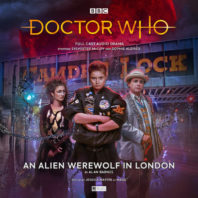
Released June 2019
SOME SPOILERS FOLLOW
The notion of an elder Seventh Doctor tying up loose ends and traversing universal themes of identity and sense of self alongside Mags, the Vulpanan companion-who-never-was from ‘The Greatest Show in the Galaxy,’ is a brilliant one that has resulted in two captivating if fairly traditional tales to begin this latest trilogy. As a finale in ‘An Alien Werewolf in London,’ writer Alan Barnes shows the TARDIS answering a space-time summons to 1990s Camden Lock, reuniting the Doctor and Mags with Ace who is on a mission to rescue an alien being.
Given the unique later chronological placement of this story, ‘An Alien Werewolf in London’ misses an opportunity to truly explore what Ace has been doing outside of the TARDIS, instead using her more as a motivation for the main plot before inserting her more into the background than is typical. This aspect makes a certain sense given that Mags is rightly the focus of this trilogy, but aside from a few scenes brimming with a natural chemistry between Sophie Aldred and Jessica Martin her presence doesn’t add too much to what becomes a very busy narrative that quickly and for a good portion of the running time sees the lead trio separated. Fortunately, the setup she provides while attempting to rescue a sentient alien being who the wealthy Farat family has held captive for centuries is a suitably engaging hook, and the dark vampiric secrets at the heart of this clan that connect to the ancient Nosferatu promise a grand and gothic monster counterpoint to Mags’s werewolf nature that will challenge the Doctor to his fullest.
Strangely, Sylvester McCoy’s performance far too often evokes his incarnation’s more comedic younger stylings which undermines the potential threat of a world facing a vampiric transformation, and the continued insertion of superfluous popular culture references and forced jokes likewise creates an uneven and jarring tone both between and within scenes that no lead or supporting actor is quite able to steadily traverse without at times going over the top. Separating the TARDIS team is a trusted format that allows the characters to explore multiple nuances of the events at hand, but here far too many scenes are filled with lengthy expository dialogue, and just as the tension and action begin to pick up in one aspect the script insists on jumping to another slower area which never allows a sense of cohesive pacing or storytelling to really develop. That the eventual convergence of these storylines struggles to remain coherent and fails to truly deliver a momentous sense of impact is all the more disappointing given the immense potential of this story, and the painfully awkward revelation of the villainous plans through an egregious television sequence and then lengthy monologue in person resonates for all of the wrong reasons.
Barnes does try to put a few unique angles into the plot such as a character’s unique relation to sunlight built up through backstory as well as the Doctor’s apparent inability to act completely of his own accord because of an ingested chemical that carries with it the threat of boiling his blood should he act against expectations, but these ultimately only become minor blips in a story that is perfectly content to revel in traditional vampire stereotypes and overcomplicated schemes involving transformative abilities and wave transmissions tuned to individuals. With even Maggs getting little exploration of her character or internal battle, ‘An Alien Werewolf in London’ fails to capitalize on its intriguing premise and companion and instead offers a disjointed experience that struggles to use its most interesting ideas to maximum effect and that ends the trilogy on a rather underwhelming note.
- Release Date: 6/2019


Leave a Reply